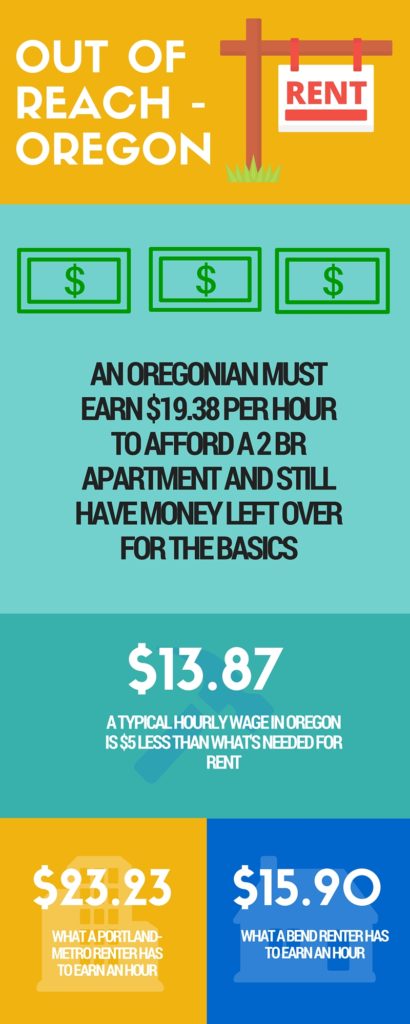 We know that everyone needs a safe, stable, and affordable place to call home. But according to the Out of Reach 2016 report just released Wednesday, renters need to earn $19.38 per hour — an increase of nearly $3 in one year—to comfortably afford a modest, two-bedroom apartment. Combined with a huge number of no-cause evictions, double-digit increases in rent, and very low vacancy rates, Oregonians who rent are facing serious barriers to housing opportunity.
We know that everyone needs a safe, stable, and affordable place to call home. But according to the Out of Reach 2016 report just released Wednesday, renters need to earn $19.38 per hour — an increase of nearly $3 in one year—to comfortably afford a modest, two-bedroom apartment. Combined with a huge number of no-cause evictions, double-digit increases in rent, and very low vacancy rates, Oregonians who rent are facing serious barriers to housing opportunity.
Out of Reach 2016, released by the National Low Income Housing Coalition, shows that Oregon is now the 18th most expensive state for renters, up from 25th in 2015. The report highlights the gap between what renters earn and what it costs to afford rent at fair market value.
Key figures from the report illustrate the growing challenges facing Oregon’s renters:
- In order to afford a modest, two-bedroom apartment at Fair Market Rent in Oregon, renters need to earn a “Housing Wage” of $19.38 per hour. This figure represents an increase of nearly $3 in what a renter must make to afford housing in just one year.
- The typical renter in Oregon earns $13.87 an hour, which is more than $5 less than the hourly wage needed to afford a modest two-bedroom home.
- In the Portland metro area, a renter has to earn $23.23 an hour to be able to afford the average two bedroom apartment and still have money left over for food, medicine, transportation, and other basic necessities.
- Outside of the Portland metro area, the landscape for renters is also harsh. Renters in central Oregon need to make nearly $16 an hour to be able to afford the average two-bedroom apartment.
For Oregonians earning minimum wage, the rental market is even harsher. While the state’s minimum wage at $9.25 is higher than the federal minimum of $7.25, there is still no affordable housing available for Oregon’s full-time minimum wage workers. A family must have 1.7 wage earners working full-time, or one full-time earner working 68 hours per week—that’s nearly 10 hour days, 7 days a week—to afford a modest one-bedroom apartment. Even with the increases to the minimum wage passed by the Legislature in 2016, the Housing Alliance believes rents will continue to significantly outpace wages.
While this report shows the housing affordability is a national issue, Oregon’s Legislature can and should do more to invest in affordable housing and protect tenants who are being displaced by rent increases. We’ll be advocating for the 2017 Legislature to do more for Oregonians who are affected by the housing crisis, including workers who are seeing their wages stagnate while rents increase.
To see more information on wages and housing affordability in Oregon, see the Out of Reach state report for Oregon, and be sure to subscribe to Housing Alliance emails to learn how you can help bring, safe decent homes in reach for all Oregonians.